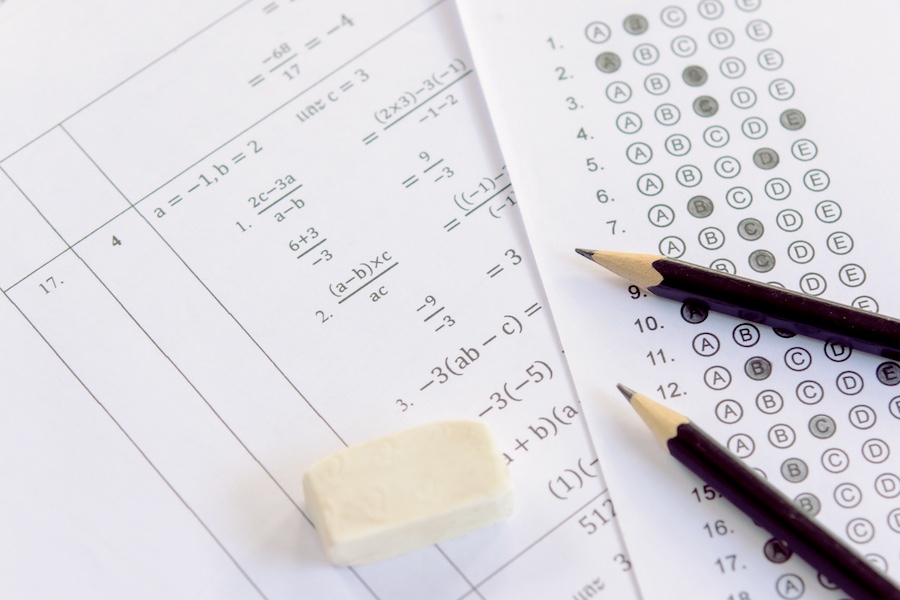Math is a very important subject, and many different fields rely upon math to function, directly or indirectly. This doesn’t necessarily make math a popular subject however, and we’ve met many students who dislike or even dread math tests.
One test in particular stands out: the SAT. There are two mandatory sections on the SAT, and math is one of them. This is a hurdle for many students, but also a great chance to show off your skills. In this article we’re going to go over what math skills the SAT expects you to demonstrate, and more importantly, how you can be prepared to demonstrate them. Let’s get started!
What Subjects the Math SAT Covers
The math SAT covers four broad subjects, each with their own subcategories of information. Each of these has a set number of questions assigned. These broad topics are:
- Algebra (13-15 questions)
- Advanced Math (13-15 questions)
- Problem Solving and Data Analysis (5-7 questions)
- Geometry and Trigonometry (5-7 questions)
These are split over two sections; one allows the use of a calculator, one does not. The different math fields are divided more or less evenly between these sections. Questions are either multiple choice or require you to provide a number as an answer. Approximately 30% of all questions are set in context, requiring you to read and understand a broader question to answer a math problem within it.
Now we’ll go through each of the broader fields, and talk about the subfields within them you will need to be familiar with.
Algebra
The algebra section includes the following topics:
- Linear equations in 1 variable
- Linear equations in 2 variables
- Linear functions
- Systems of 2 linear equations in 2 variables
- Linear inequalities in 1 or 2 variables
Linear equations are those which, when graphed, produce a line. These questions may pertain to graphs of these equations, or to the equations themselves. Some of these questions have multiple variables, and a small number will have two different equations iterating, as if two separate lines exist on the same graph.
Advanced Math
This is an oddly named section, but it is meant to encompass the math you will need as the basis for other STEM fields. The skills they are looking for include demonstrating an understanding of absolute value, quadratic, exponential, polynomial, rational, radical, and other nonlinear equations. These fall into the following kinds of questions:
- Equivalent expressions
- Nonlinear equations in 1 variable
- Systems of equations in 2 variables
- Nonlinear functions
Nonlinear functions and equations are those which do not produce a line. For example any equation which involves exponents attached to variables is considered nonlinear. As with the section above, these questions may contain one or two variables.
Problem Solving and Data Analysis
This portion, unsurprisingly, mostly focuses on math in the context of data; looking at the relationship between different values both graphically and otherwise and drawing conclusions from that information. Specifically, they want you to be able to demonstrate the following skills:
- Ratios, rates, proportional relationships, and units
- Percentages
- One-variable data: distributions and measures of center and spread
- Two-variable data: models and scatterplots
- Probability and conditional probability
- Inference from sample statistics and margin of error
- Evaluating statistical claims: observational studies and experiments
You may notice that there are more topics than there are actual questions (5-7) generally assigned to this section. You are not likely to see all of the above topics come up in every iteration of the SAT or practice test you take, but you do still need a degree of familiarity with them.
Geometry and Trigonometry
These are the studies of shapes in space, both on their own and in reference to other pieces of information. The SAT does provide a set of equations for you to reference if need be, though it is better and faster to have them memorized when approaching these problems. They look for the following skills specifically:
- Area and volume formulas
- Lines, angles, and triangles
- Right triangles and trigonometry
- Circles
As with the topic above, you will likely not see questions about every one of these skills and their applications on every iteration of the SAT. While you do still need to be familiar with them, they are less common.
How to Prepare for the Math SAT
This looks like a lot of information you need to know, and when viewed this way, can feel overwhelming to students. The SAT really expects you to learn all of this? The trick is simple: these are all of the subjects most students will cover in their normal high school courses by the time they take the SAT.
In the normal sequence of coursework, you will have all of the math skills you need for the SAT from your Algebra I, Geometry, and Algebra II courses. This may vary based on the exact curriculum your school follows, but most students will have completed these courses before they take the SAT. Even schools which take a less defined math curriculum still cover these early in high school, as these are the math skills students need before embarking on calculus.
Math beyond this is still useful of course. The math courses you take in high school build upon each other, so what you do in precalculus will let you hone your skills at algebra. There are no specialized math classes you need to take to gain the skills you need to complete the SAT questions, all you need to do is pay attention and do well in your math classes.
Of course, this is easier said than done. Many math teachers are excellent at what they do and inspire their students greatly, but sadly this is not the case for all of them. In these cases, there may be subjects where you do not have the mastery of the material you want. In this case, there are some options you can turn to to learn the needed material:
- Khan Academy: Khan academy has both partnered with College Board to offer official preparatory exams for the SAT, and is a great source to learn about math generally. The materials they offer will give you exactly the knowledge you need for this test.
- Math Academy: As we’ve discussed before, Math Academy is a great site for the general exploration of math, to supplement what you learn in the classroom. If you aren’t confident with what you’ve learned so far this is a great tool to use. It is not directly aimed at the SAT, but math skills are remarkably transferable.
Finally, there really is no substitute for targeted studying. As we discuss in our guide to studying for the SAT, determining what subjects you need more work on, and targeting those directly in your studying, is the most efficient way to proceed. We suggest taking a practice test, so you both understand the material you are likely to face, and how it will be presented to you.
Indeed, the format of the math questions is more likely to trip you up than the subjects covered. College Board isn’t trying to fool you with their questions, but they are often quite different in format from what you may have seen before in a math class. Getting used to this ahead of time is one of the best ways of preparing for the SAT.
Final Thoughts
Math may not be everyone’s favorite subject, but that doesn’t make it any less important, or less relevant to what you need to know. We hope this article has given you a solid introduction to what math skills you will need for the SAT, and how you can go about acquiring them for yourself.
Of course, one of the best ways to prepare for the SAT is to get help from an expert, somebody who knows exactly what the test will ask, and exactly which skills you need to master to approach it, both in terms of subject material and for the format of the test’s questions. Ivy Scholars’ Test Prep service is exactly that, and students we work with improve their SAT scores by an average of 180 points. Schedule a free consultation today to learn how we can help you master the math section of the SAT.








